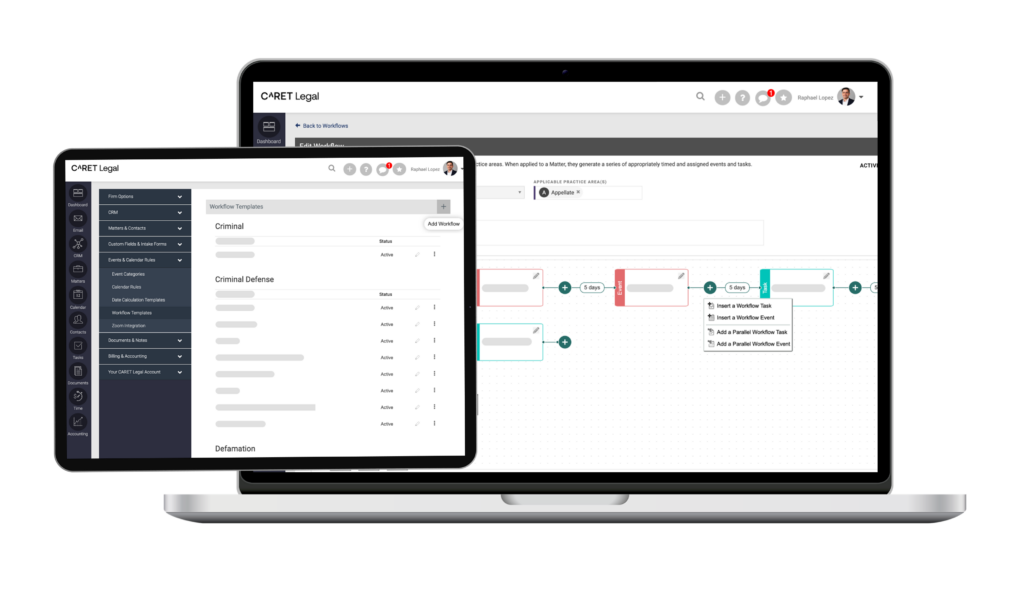AI is expected to automate nearly half of legal tasks in the US and Europe.
Several legal technology trends are reshaping how law firms operate. These trends, from artificial intelligence (AI) to remote depositions and digital reporting, promise to streamline operations, enhance service delivery, and even change the way we approach litigation.
Artificial Intelligence and GenAI in Legal Tech
One of the most prominent law firm technology trends is the use of Artificial Intelligence (AI), including Generative AI (GenAI). According to a Goldman Sachs report, AI is expected to automate nearly half of legal tasks in the US and Europe. The application of AI in law firms is multifaceted, ranging from research and predictive analysis to document management and task automation. AI’s ability to handle vast amounts of data and make intelligent decisions is a game-changer. It not only saves time but also enhances the accuracy of legal research, contract review, and document drafting.
AI Document Summaries and Data Extraction
CARET Legal’s Quick Summary utilizes AI technology to enable a more efficient workflow for all types of law firms with the ability to navigate complex documents instantly and accurately. It offers a wide range of applications including extracting and summarizing key terms, clauses and obligations from contracts and agreements, helping legal professionals like you more quickly identify potential risks, compliance issues or opportunities.
Firms can also scan handwritten text and images of text into CARET Legal. Our AI-enabled OCR can detect street signs and car license plates, recognize paragraph text, recognize handwriting, and work with virtually all file types including PDF, JPG, PNG, TIFF.
Remote Depositions Are Becoming More Normal
One of the most significant shifts we’ve seen is the accelerated adoption of remote depositions. This law firm technology trend, which emerged as a necessity during lockdowns and social distancing mandates, is expected to stay. Remote depositions, conducted via web or telephone conferences, have revolutionized the litigation process. They enable participants from different locations to come together without the need for physical presence, making the deposition process more flexible and accessible.
This not only enhances efficiency by eliminating travel time and expenses, but it also reduces costs for clients and can potentially expedite the litigation process. With the ability to schedule and conduct depositions virtually, legal professionals can move cases forward more quickly, benefiting all parties involved. However, the shift to remote depositions also necessitates robust, reliable communication technology. Law firms must ensure they have the necessary tools and platforms to facilitate smooth remote depositions. These include secure video conferencing tools, digital exhibit-sharing solutions, and high-quality audio and video recording capabilities.
Digital Reporting: The Emergence of a New Legal Tech Trend
In the world of litigation, accurate record-keeping is paramount. Traditionally, this task has fallen to stenographers, who transcribe legal proceedings word for word. However, the legal industry is currently facing a shortage of stenographers, leading to the rise of another budding law firm technology trend: digital reporting.
Meeting Clients’ Digital Expectations and Effectively Adopting New Technology
Your firm’s software should not only increase collaboration and productivity among your staff, but also satisfy your clients’ needs for enhanced security, increased communication and greater efficiency.

Digital reporting is an innovative solution that’s gaining traction in the legal sector. Digital reporters, armed with state-of-the-art recording equipment and software, step in to fill the gap left by the dwindling number of stenographers. They record the audio from legal proceedings and then produce verbatim transcripts. But digital reporting is more than just a stopgap measure—it’s a transformative technology that offers several advantages.
For one, digital reporting can be more efficient and cost-effective than traditional stenography. Digital reporters can quickly produce accurate transcripts at a lower cost and can easily work remotely, making them a viable option for remote hearings or depositions. They can also provide digital real-time transcriptions that can be uploaded to client case files, making it easier for attorneys and other legal professionals to keep track of proceedings as they unfold. We can expect digital reporting to become an increasingly common feature in law firms and courtrooms. With the ongoing advancements in technology, digital reporting is set to revolutionize the way legal proceedings are documented, offering law firms a more efficient, flexible, and cost-effective solution to traditional stenography.
Automation will likely penetrate deeper into the legal department’s core activities, further optimizing the in-house workflow.
Regulatory Compliance Solutions and Process Automation
Law firms need sophisticated tools for data protection, breach response, and compliance with data and privacy laws. Legal technology will play a crucial role in this area. In addition to enhancing cybersecurity, the rise of no-code and low-code process automation is transforming in-house legal operations, making routine tasks such as data privacy compliance, document generation, and contract review faster and less prone to human error. Automation will likely penetrate deeper into the legal department’s core activities, further optimizing the in-house workflow. These advancements not only promise to streamline compliance processes but also free up legal professionals to focus on more strategic tasks.
Legal Project Management Tools and Workflow Automation
Advancements in legal project management software hold great promise. The next generation of legal practice management software will continue to automate routine tasks and streamline workflows, freeing up legal professionals to concentrate on more complex aspects of their work. By offering robust tools for budget tracking, workflow automation, and resource allocation, this software is set to revolutionize law firm operations, bringing them into closer alignment with business outcomes and enhancing their overall value to the organization.

CARET Legal Workflows
Legal Software That Stays in the Know
It’s challenging to stay on top of legal technology trends and what tools might benefit your firm, but we can help. CARET Legal is more than just a legal software provider; we’re a partner who understands your challenges and is ready to help you transform them into opportunities. Our commitment is to empower your law firm to not just survive but thrive in this exciting new era of legal technology.
So, why wait? Step boldly into the future and harness the power of these new law firm technology trends with CARET Legal. Schedule a free demo and let’s explore how our innovative solutions can drive your firm’s success in 2024 and beyond!
